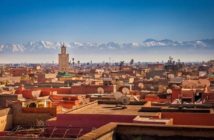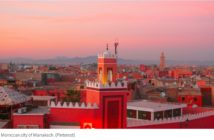Morocco News Board
 This year Ramadan runs from about July 20th to August 19th, so right in the middle of summer holidays. Marrakesh is usually bursting with tourists at this time of year, despite the scorching heat. I have seen groups of sunburned, dazed and confused looking tourists walking around, probably not too sure about what’s going on, except that Macdonalds seems to be the only restaurant open for lunch.
This year Ramadan runs from about July 20th to August 19th, so right in the middle of summer holidays. Marrakesh is usually bursting with tourists at this time of year, despite the scorching heat. I have seen groups of sunburned, dazed and confused looking tourists walking around, probably not too sure about what’s going on, except that Macdonalds seems to be the only restaurant open for lunch.
The new moon marks the beginning of the month of Ramadan.

1-Don’t pity us. Yes, I know it’s 47 C outside here in Marrakesh (that’s 118 F) and you can about boil a pot of that famous mint tea on the sidewalk. I know that this Ramadan has the longest daylight hours in the last 33 years. It sure must seem like we are suffering terribly. But here’s the thing: we like to fast. We look forward to this all year long. It’s like a beloved is returning to us. My dear non-Muslim friends, I appreciate your sympathy. ”It must be really hard” you tell me. And it is. You apologize to me, wishing you could offer me a glass of water. And I thank you sincerely. But I wouldn’t trade a moment of this in for anything. No need to apologize, I’ll drink that water later, for darn sure. But right now I am emptying out, disengaging, and so is this whole country, all for a chance to come a little closer to the awesome and mysterious Divine.
3-Don’t feel like you’re torturing me by eating in front of me. It’s really ok. Go ahead, drink that glass of water. No, I’m not drooling over you salad. Fact is I’m around food a lot during the day. The kids still need their breakfast, snack, lunch, snack and all that. What I’ve noticed thought is that when I’m fasting, food is like dead to me. I’m just in the zone. I’m not attracted to it in the least, don’t crave or obsess over it as I do when I’m not fasting. And I think this applies to most people. So when I see non-Muslims eating during the day, it’s not a big deal for me. The general rule is you don’t have to hide it, but you shouldn’t flaunt it either. Seeing tourists sitting in restaurants eating lunch doesn’t bother anyone, but seeing someone walk down the street chugging an ice cold Pepsi, ouch, that does hurt a little.
4-Do try to get invited for ftour. That would be of course the breaking fast meal around 7:40 p.m. It’s such a family oriented event in Morocco, and there is always much care and love put into food preparation. Moroccans eat a small meal at break fast and another dinner later on. The ftour is almost the same for the whole country, dates and water, some kind of soup either harira or barley, boiled eggs with cumin, chebbakia and slilou which are some complicated sweets that I won’t bother describing, and a smoothie like avocado and milk and sugar. It’s a shared ritual for sure. If you want to have a very Moroccan experience this is definitely it.

Gathered for the ftour meal
5-Don’t smoke in public. Yeah I’d put more emphasis on this one than on not eating/drinking, for several reasons. One is that there are smokers all around you who are in some state of nicotine withdrawal and that’s more intense than mere food deprivation. Two is that the actual smoke can break people’s fast. Of all the cranky fasters, I’d say the deprived smokers can be the worst, so bad in fact that there is a specific term used to describe a smoker who is losing it during Ramadan “maqtou3″, literally “cut off”. A blanket term used to explain the occasional flaring of tempers in the late afternoon.
6-Do appreciate the silence. That last 30 minutes before the call to prayer that marks sundown. The streets start to empty save for those last minute crazy drivers who know that traffic laws are not in effect at sunset. Then after the call to prayer, it’s a ghost town. Not a soul is out and about. In Marrakesh, a city of 1 million, there’s no other time where you could literally run down the street with your eyes closed and not get run over by anything. Not by a bus, truck, taxi, horse-drawn carriage, mule cart, donkey, moped, bike or walker! It adds to that special Ramadan “expect the unexpected” feeling. One minute the streets are teeming with last minute shoppers buying baghrir, jben or avocados for ftour, the next minute it’s like that dream where you are the last person on earth. Savor the moment.
7-Don’t expect much. In the daytime that is. With the fasting day being 16 hours long, and it being August vacay mode, believe me there is no impetus for waking up early. In our family we wake up between 9 and 10 a.m. and if you go out it’s like it’s dawn and you’re the early bird. The shops around here don’t throw open their blinds til 11 or 12. Cause they plan to open all day, close for ftour, and re-open at night. As afternoon rolls by, you can expect some blank stares, people can just start to get spaced out. Chapped lips, bad breath. Crankiness. Be compassionate. Know that the fast is different for each person, they may be having a particularly difficult day. Love them anyway.
8-Don’t be alarmed if you hear the canons roar. The pirates are not attacking the coasts. The city fires off canons to to mark the start and end of each fasting day, in case any doubt remained. Some neighborhoods have air raid sirens that go off to mark the fast. Where I live now I can only hear the canons. This way even those who live far from a mosque can still know it’s time to break fast.
9-Do shake your head at the irony of it all. Ramadan is a time of giving up food and drink for a certain time, but ironically we Moroccans consume a lot more food than usual. There are always the special reports from the Ministry of Agriculture assuring everyone that there will be enough eggs and chickpeas to meet “the increase in demand”. The shops totally cater to the frenzy as well. This year maybe the heat slowed people down a little. I do try to make the ftour meal special, but ours has lots of juice, fruit and salad. Hard to resist this:
10-Do enjoy the nights. Because in Ramadan, the nights are the real days. There are night prayers in every major mosque that start about an hour after sunset and last for an hour and a half. For Muslims, these prayers are the other half of the Ramadan equation. After the emptying out all day, this is the replenishing. I was interested to see a long line of tourists sitting near the Koutoubia mosque, enjoying the night breeze and watching the night prayers that are held in the open courtyard outside the mosque. The courtyard fills with some 5000 people who stand, sit and prostrate as the imam recites passages from the Quran. This is probably the most public prayer conducted year round so I can see why people would want to see what it’s like. After the prayers, the streets, cafes and shops come to life all over again, and it’s a light, almost giddy feel. After the inward breath and contraction of the day, this is the great expanse again.
.







